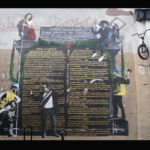Quote:
1. Men are born and remain free and equal in rights. Social distinctions may be based only on considerations of the common good. 2. The aim of every political association is the preservation of the natural and imprescriptible rights of Man. These rights are Liberty, Property, Safety and Resistance to Oppression. 3. The principle of any Sovereignty lies primarily in the Nation. No corporate body, no individual may exercise any authority that does not expressly emanate from it. 4. Liberty consists in being able to do anything that does not harm others.
Source:
Author Bio:
The Declaration of the Rights of Man and of the Citizen (Déclaration des Droits de l'Homme et du Citoyen) is one of the fundamental texts of the French Revolution.
Context:
 The French Revolution’s motto was liberté, egalité, fraternité (liberty, equality, fraternity). It abolished the absolutist monarchy (Louis XIV: ‘I am the state’) and established a new system of rule. Feudal power structures were replaced with governance by the majority population and the royal family was executed. The revolution is seen as one of the Enlightenment’s decisive events, and its importance extends to how it addressed human rights, democracy and forms of government. However, the period of revolutionary terror, which sent all perceived enemies of the revolution within France to the guillotine, is usually judged critically. For example, Olympe de Gouges was executed in 1793 when she demanded universal human rights for women as well as men. In 1799, General Napoléon Bonaparte assumed the rank of First Consul of the republic, asserting absolute dictatorial power, which he later confirmed by declaring himself Emperor. At the same time, France had colonies. In fact, in the 19th century, it was the second largest colonial power in the world. Neither equality nor inalienable human rights applied to these areas.
The French Revolution’s motto was liberté, egalité, fraternité (liberty, equality, fraternity). It abolished the absolutist monarchy (Louis XIV: ‘I am the state’) and established a new system of rule. Feudal power structures were replaced with governance by the majority population and the royal family was executed. The revolution is seen as one of the Enlightenment’s decisive events, and its importance extends to how it addressed human rights, democracy and forms of government. However, the period of revolutionary terror, which sent all perceived enemies of the revolution within France to the guillotine, is usually judged critically. For example, Olympe de Gouges was executed in 1793 when she demanded universal human rights for women as well as men. In 1799, General Napoléon Bonaparte assumed the rank of First Consul of the republic, asserting absolute dictatorial power, which he later confirmed by declaring himself Emperor. At the same time, France had colonies. In fact, in the 19th century, it was the second largest colonial power in the world. Neither equality nor inalienable human rights applied to these areas.Further Reading:
*Edmundo Murray (2008): Review of Jean Ziegler's "La haine de l’Occident".
Year:
1789